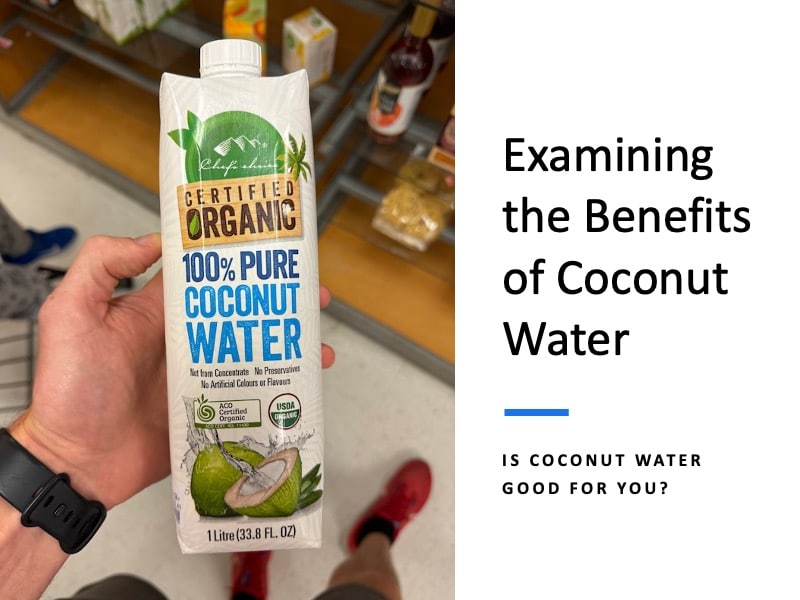Coconut Water Benefits: Is Coconut Water Good for You?
Coconut water is hands down one of my favorite beverages.
As a professional basketball player and someone with a Master’s degree in Nutrition Education, I take hydration seriously—both on and off the court.
Over the years, I’ve tried just about every sports drink and recovery beverage on the market, but few options are as naturally refreshing and nutritionally impressive as coconut water.
It’s not just the taste. Coconut water is an incredible source of potassium and other hydrating electrolytes that support nerve signaling, muscle contractions, and fluid balance.
Whether I’m coming off a long training session or just need something to sip on during the day, coconut water is a go-to in my routine.
But like any nutrition decision, context matters.
Despite the surge in popularity and all the glowing reviews, coconut water isn’t perfect—especially for performance-driven athletes.
One of my biggest concerns is its low sodium content, which makes it a poor standalone option during periods of heavy sweating.
For athletes who lose a lot of salt through sweat (and that’s many of us), relying solely on coconut water for rehydration can potentially backfire.
The high potassium-to-sodium ratio might disrupt electrolyte balance and, in rare cases, even contribute to hyperkalemia—a serious and dangerous condition.
That said, coconut water is good for you, undeniably. There is a long list of health benefits of coconut water that extend well beyond the world of sports.
It’s a fantastic alternative to sugary sodas, offers real nutritional value, and plays a meaningful role in a healthy lifestyle when consumed in moderation and in the right situations.
In this guide, I’ll break down everything you need to know about coconut water—its benefits, its limitations, and how to choose the right one at the store—so you can enjoy it confidently as part of a well-balanced diet.
With global sales projected to surpass $4.2 billion in the U.S. by 2028, it’s time to separate marketing hype from real health value (Technavio, 2024).
What Is Coconut Water?
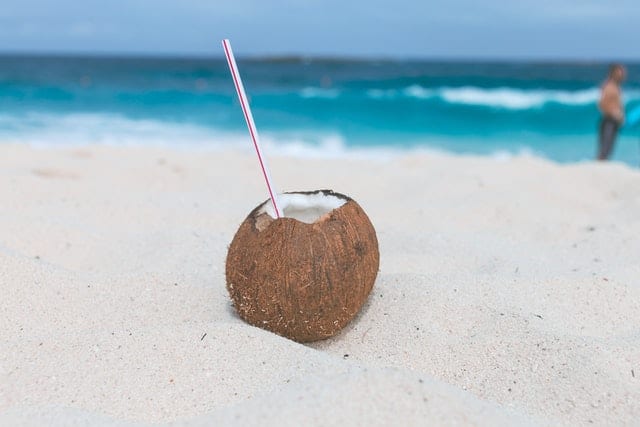
Coconut water is the clear, slightly sweet liquid found inside young green coconuts. It’s not to be confused with coconut milk, which is made by blending coconut meat with water—creating a much thicker, higher-fat product.
Naturally sterile and rich in electrolytes, coconut water has been consumed for centuries in tropical regions as a refreshing drink and natural hydration aid.
Its unique nutrient composition includes potassium, magnesium, calcium, and a small amount of sodium, along with natural sugars, B-vitamins, amino acids, and antioxidants.
Because it comes straight from the inside of the fruit, coconut water is low in calories, free of fat and cholesterol, and minimally processed when bottled properly.
That’s part of what makes it so appealing to health-conscious individuals and athletes alike—it’s a natural, plant-based beverage that doesn’t need synthetic additives to be effective or enjoyable.
Nutritional Composition of Coconut Water
What sets coconut water apart from other hydration drinks is its naturally occurring blend of electrolytes, carbohydrates, and bioactive compounds—all packed into a low-calorie, plant-based beverage.
Understanding its nutritional profile is key to knowing when and how to use it effectively, whether you’re training hard or simply trying to stay healthy and hydrated.
Key Electrolytes and Nutrients
A single cup (240 mL) of coconut water typically contains:
- Potassium: ~600 mg (13% DV)
- Magnesium: ~60 mg
- Calcium: ~58 mg
- Phosphorus: ~48 mg
- Sodium: ~250 mg or less
This makes coconut water one of the richest natural sources of potassium—more than a banana—and a helpful contributor to daily electrolyte needs, especially for individuals with low fruit and vegetable intake.
Carbohydrates and Sugar Profile
Coconut water offers ~9 grams of carbohydrates per serving, primarily natural sugars like glucose and fructose.
Its moderate glycemic index supports gentle blood sugar elevation without dramatic spikes, making it a balanced energy source for both athletes and sedentary individuals.
Bioactive Compounds
Beyond electrolytes, coconut water contains cytokinins—plant hormones with antioxidant and anti-inflammatory properties—along with small amounts of amino acids, B-vitamins, and phytonutrients that may enhance immune support and recovery (Yong et al., 2009).
Health Benefits of Coconut Water – What is Coconut Water Good For?
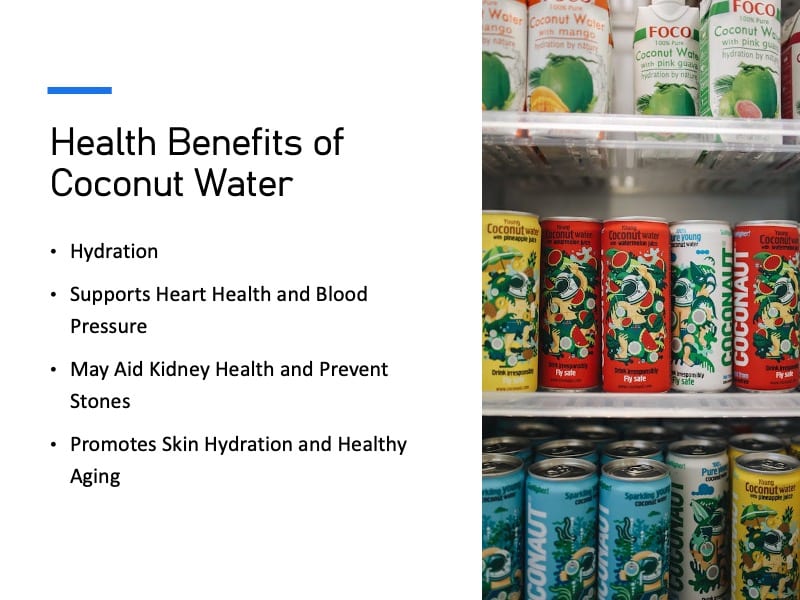
The benefits of coconut water extend far beyond its refreshing taste.
Packed with essential electrolytes, antioxidants, and naturally occurring sugars, this tropical drink supports hydration, heart health, digestion, and even skin vitality.
Whether you’re an athlete or simply aiming to make healthier beverage choices, coconut water offers functional, everyday wellness benefits that are hard to overlook.
Hydration
One of the most well-known benefits of coconut water is its ability to support effective hydration.
Thanks to its naturally balanced electrolyte profile—especially its high potassium content—coconut water helps replenish fluids lost through sweat, daily activity, or even mild dehydration from illness or travel.
Unlike sugary sodas or artificially colored sports drinks, coconut water offers a clean, plant-based source of hydration with fewer calories and no synthetic additives.
It contains small amounts of sodium, magnesium, calcium, and phosphorus, which work together to maintain proper fluid balance, support nerve function, and regulate muscle contractions.
Coconut water also has isotonic properties, meaning its concentration of solutes is similar to that of human blood.
This allows for rapid absorption and makes it an efficient hydration option for light exercise, hot weather, or everyday wellness needs (Intan Kailaku et al., 2015).
Whether you’re rehydrating after a workout, spending time in the sun, or simply trying to increase your fluid intake throughout the day, coconut water provides a naturally refreshing and effective solution.
Although coconut water may not always be the best choice for athletes during intense or high-sodium-loss training—as explained below—it still serves as an effective and healthy hydration drink for most people in everyday situations.
Supports Heart Health and Blood Pressure
Coconut water’s high potassium content helps counterbalance sodium intake, supporting healthy blood pressure regulation and cardiovascular health (Alleyne et al., 2005).
This is especially valuable in Western diets, which are often low in potassium and high in salt.
May Aid Kidney Health and Prevent Stones
Some evidence suggests that coconut water may help reduce the formation of kidney stones by decreasing crystal and stone formation in the kidneys (Patel et al., 2018).
However, this benefit appears most promising in those with low stone risk.
Promotes Skin Hydration and Healthy Aging
Thanks to its hydrating properties and antioxidant content, coconut water may help you get healthier skin and slow oxidative stress-related aging, though more clinical trials are needed to confirm these cosmetic claims (Na Nakorn et al., 2024).
Examining the Role of Coconut Water for Athletes
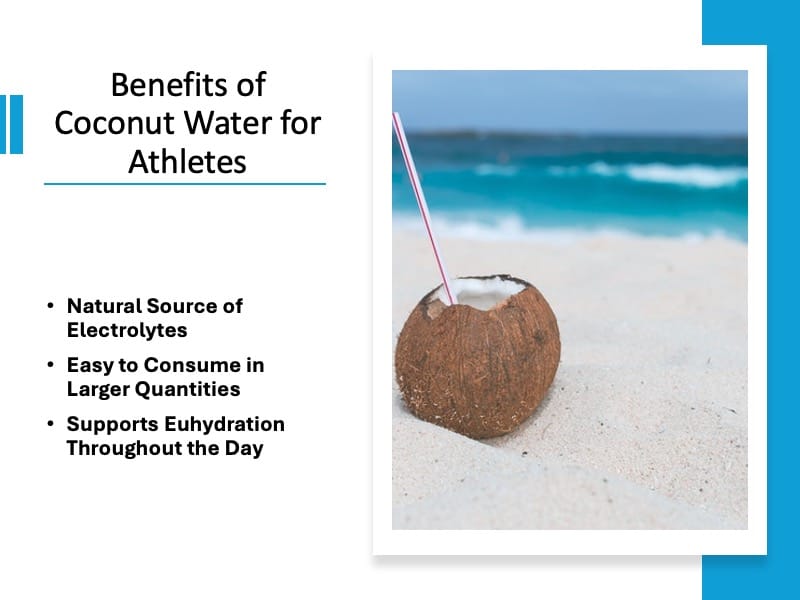
For athletes and performance-driven individuals, coconut water offers a naturally sweet, easily digestible alternative to traditional sports drinks.
Its isotonic properties—meaning its electrolyte concentration is similar to that of human blood—make it efficient for fluid absorption (Intan Kailaku et al., 2015).
When used appropriately, coconut water can:
- Support post-workout hydration
- Reduce nausea and stomach discomfort compared to commercial sports drinks (Kalman et al., 2012)
- Provide essential potassium to prevent cramping and promote recovery
When is Coconut Water Good for Athletes?
Despite its appeal, coconut water isn’t a blanket solution for athletic hydration. The key is using it strategically.
Best Uses
- Light to moderate workouts (<60 minutes)
- General hydration throughout the day
- Recovery 3–4 hours after training, paired with sodium-rich food
When Isn’t Coconut Water Enough for Athletes?

While there are benefits of coconut water for athletes, it falls short in specific hydration scenarios:
- Lacks Sufficient Sodium: Athletes lose large amounts of sodium through sweat. Coconut water contains far less sodium than what’s needed during intense training (Evans et al., 2017).
- No Performance Edge: Studies show coconut water does not enhance performance during endurance or resistance exercise compared to water or electrolyte drinks (Peart et al., 2017).
- Risk of Hyperkalemia: Overconsumption can lead to dangerously high potassium levels, particularly in those with kidney issues (Hakimian et al., 2014).
Situations to Avoid
- Intense or prolonged training in hot, humid conditions
- Periods of heavy sweat loss or high sodium depletion
- Individuals with kidney disorders or on potassium-sparing medications
In these cases, coconut water’s low sodium content and high potassium may worsen electrolyte imbalances, potentially leading to complications such as hyperkalemia (Rees et al., 2012).
How to Choose the Best Coconut Water at the Store
Not all coconut waters are created equal. Here’s what to look for when shopping:
What to Look For:
- “100% Coconut Water” on the label
- No added sugars or artificial flavorings
- Cold-pressed or minimally processed options
- Sustainably sourced or organic-certified if possible
What to Avoid:
- Flavored varieties with added sweeteners
- “From concentrate” options
- Plastic packaging with BPA (opt for Tetra Paks or glass bottles)
The most nutrient-dense coconut waters tend to come from young green coconuts harvested in Thailand, the Philippines, or Brazil.
Best Alternatives to Coconut Water for Active Hydration
If coconut water doesn’t meet your hydration needs, consider these alternatives:
- Water: Ideal for short-duration or low-intensity sessions.
- Electrolyte Drinks: Such as Celsius Hydration Packets, Liquid I.V., LMNT, or Nuun, which offer customizable sodium levels.
- DIY Hydration: Mix filtered water, sea salt, citrus juice, and raw honey or maple syrup.
- Milk: Particularly goat’s milk, for post-workout protein and electrolyte replacement.
- Tart Cherry & Watermelon Juice: Natural recovery options rich in antioxidants and anti-inflammatory compounds.
Last update on 2025-04-25 / This article includes affiliate links/Images via Amazon Product Advertising API. I may earn commissions on purchases made through these links.
Final Verdict: Is Coconut Water Healthy & Worth the Hype?
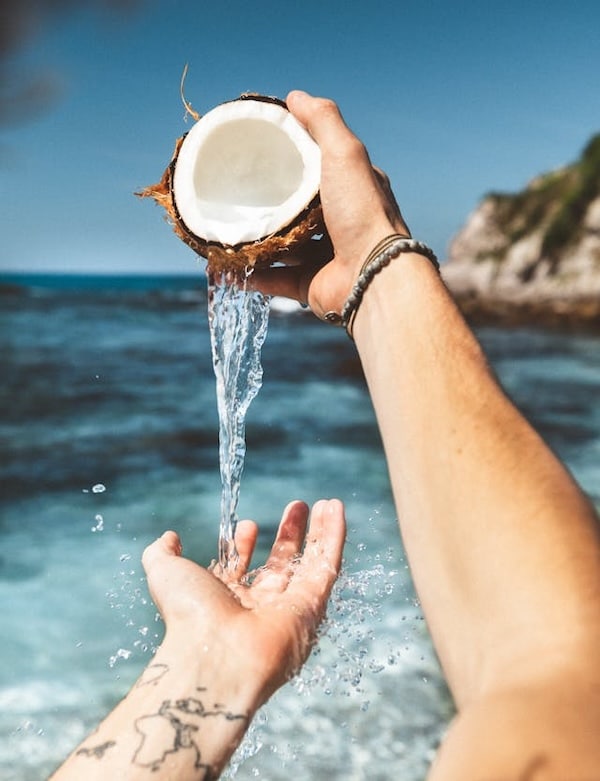
Coconut water is more than a trendy beverage—it’s a hydrating, nutrient-rich drink with clear benefits for general health and moderate activity.
Although coconut water may not always be the best sports drink for athletes during intense or high-sodium-loss training, it still serves as an effective and healthy hydration drink for most people in everyday situations.
Its high potassium and bioactive compounds make it an excellent daily drink for most people, especially when replacing sugary sodas or juices.
For athletes, coconut water can be a useful hydration tool—when used strategically. It’s not a replacement for sodium-rich sports drinks during intense workouts, but it can support hydration outside of training windows or during light sessions.
In a world saturated with artificial sports drinks and sugar-laden energy boosters, coconut water offers a refreshing alternative grounded in nature—but understanding when and how to use it is key to unlocking its full benefits.

